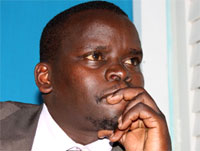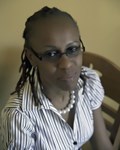Kenyan radio journalist Joshua arap Sang is at the Hague, Netherlands for the confirmation of charges hearing at the International Criminal Court (ICC). Sang who has made history as the first Kenyan journalist to face charges at the ICC is among five other Kenyan politicians and senior government officials said to bear "the greatest responsibility" for the political violence that followed a disputed presidential result in January 2008.

Joshua arap Sang
Sang a journalist working at a Kalenjin vernacular radio station, KASS FM, is the host of morning show "Lene Emet", which means what is the world saying? He is among the first three Kenyan suspects attending a 12-day pre-trail hearing at the Hague to determine if there is adequate evidence to proceed to a full trial - the hearing begun on 1 September 2011.
Sang's co-accused are two members of parliament and politicians from Rift Valley - William Ruto and Henry Kosgey. The three are accused of establishing a network with the goal of gaining power in the Rift Valley Province by committing crimes against supporters of the Party of National Unity (PNU).
According to Luis Moreno Ocampo, the ICC prosecutor, Sang allegedly had a major role in the planning and organisation of crimes against PNU supporters by using his radio show ("Lene Emet") both to gain support and also communicate by code to the members of the network on when and where to commit attacks.
The Pre-Trial Chamber said the material presented to them by the prosecutor provided grounds to believe that Sang placed KASS FM at the disposal of the network, advertising the organisation's meetings and using his on-air position to spread hate messages and incite violence by broadcasting false news regarding alleged murders of Kalenjins.
On Friday 2 September 2011, day two of the hearing, Ocampo said the network formed by the three had a media component where Sang played a leading role in coordinating attacks using his broadcasts, and incited Kalenjin against Kikuyu's and other PNU supporters.
Sang and his co-accused first appeared before the ICC on 7 April 2011. This had been followed by a confirmation of charges hearing to determine whether there is enough evidence to establish substantial grounds to believe that the suspects committed the crimes they are being charged with. If the charges are confirmed, the person will to trial before a Trial Chamber.
The Kenyan media and post-election violence
Just like in the Rwanda genocide, fingers have been pointed at the Kenyan media as a whole for the role they played before and after the election period in 2007 and during the violence in early January 2008. Reports have indicated that long before the 2007 Kenyan General Election, vernacular radio stations had ignited ethnic consciousness among the listeners "making them support leaders from their own tribe and harbour bad feelings about people from other communities."
Sections of the media fraternity say professionalism and objectivity was thrown out of the window by some media houses. During election time, political parties and politicians spent millions of shillings to run campaigns and adverts on print and broadcast media. This could then be a case of he who pays the piper calls the tune. With an upcoming election in 2012, the Kenya media will be in the spotlight again.
Sang is among few journalists around the world to stand before an international criminal court. The editor of Der Stürmer, a Nazi newspaper was sentenced to death at the Nuremberg war crimes court in 1946 for the role he played in preaching anti-Semitism. In Africa, following the 1994 Rwanda genocide, the International Criminal Tribunal for Rwanda convicted three journalists for participating in the genocide against the ethnic Tutsi population. A fourth journalist was convicted for inciting genocide.




























